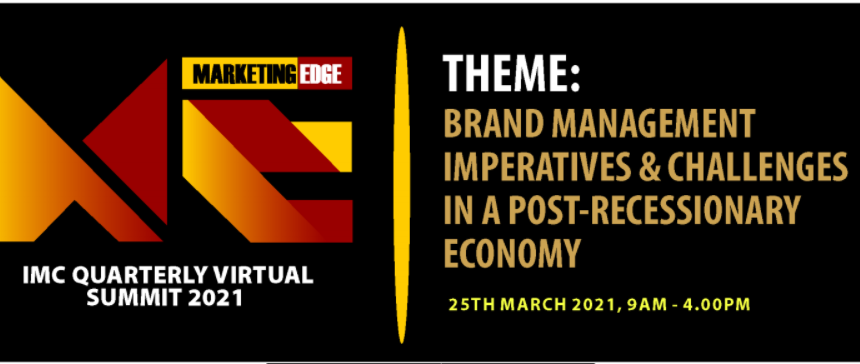Recessions bring changes to the marketplace that no brand or business can predict. These changes usually continue to shape respective markets and drive exponential evolution even after the recession. The brands that emerge ready to compete in the new marketing landscape are always those that recognised the unique opportunities that arose during the recession.
The dark economic recession clouds on Nigeria’s horizon have disappeared if the National Bureau of Statistics’ (NBS) Q1 report that the country had exited recession is anything to go by; but the aftermath remains a challenge that brands and businesses must tackle head on in a post-recession.
To demonstrate that brands and businesses need to do more than merely survive a recession in a competitive landscape, MARKETING EDGE, Nigeria’s foremost brand and marketing magazine, has recently organised the first-ever virtual quarterly summit. The summit, themed “Brand Management Imperatives and Challenges in a Post-Recessionary Economy”, which saw some of the Integrated Marketing Communications’ (IMC) thought leaders and sectoral heads in attendance, dissected contemporary industry issues and challenges, and charted a way forward.
John Ajayi, an industry authority and Managing Director/CEO of MARKETING EDGE, while declaring the summit open with a welcome speech, enunciated the goals of the summit, describing the initiative as an effort aimed at reinforcing the MARKETING EDGE brand as a strong, innovative, creative and digital savvy agenda setting media platform. Ajayi also pointed out that the need for constant exchange of marketing and advertising knowledge with a view to leading conversations on contemporary industry issues is the rationale behind the Quarterly Summit.
He further explained that the summit was in response to the struggle and challenges that Covid-19 pandemic has imposed on brands and businesses as they struggle to achieve minimal success, adding that an array of industry professionals of reputable creed and pedigree were assembled to offer incisive insights on the theme that hunts all advertisers, agencies, media and other service providers in the IMC sector.
Baba Awopetu, the Guest Speaker and a marketer of international repute, who keynoted the summit from faraway Canada, mentioned trust as more important than data in a post-recession economy. He said that data on its own is useful, but trust is more important. “People buy from people they trust. Trust is the equilibrium on which company and customer relationship can be balanced.” Awopetu opined that marketers live in the future and therefore should be the architects of the future.
Also speaking, Steve Babaeko, President, Association of Advertising Agencies of Nigeria (AAAN), described the times as uncertain which do not require any manual to survive. Asserting that it requires new thinking to navigate the post-recession economy, he said: “Most importantly, this is the time to adopt non-contact solution – just as Mr. Ajayi and his team have done by putting this virtual summit together.”
Babaeko believes that when advertising does its job, other businesses which rely on advertising will equally do well. He, however, advocated that the rules of engagement should be re-negotiated among the sectoral bodies. “The government needs to look seriously at our industry and come up with a relief package such as tax rebate.”
On his part, Femi Adelusi, President, Media Independent Practitioners Association of Nigeria (MIPAN), suggested that players in the marketing communications industry should influence government policy deliberately through lobbying.
For Yomi Badejo-Okusanya, Managing Director, CMC Connect, to survive in the post-recession economy, businesses may have to borrow locally and internationally. He thinks it is imperative to consider collaboration in the post-recession economy.
Speaking specifically on digitisation, Oti Ukubeyinje, a digital marketing professional, said that Internet penetration is growing faster than human population, adding that contemporary brands are dealing with increasingly informed and connected consumers. “Consumers want speed. The new set of consumers on the Internet superhighway is not ready to deal with complexities. In the world of digital, you’re not only competing within your sector. In the digital ecosystem, a brand could be competing with any other brand irrespective of the sector.”
Richard Iweanoge, General Manager, Brands & Communication at MTN Nigeria, who encouraged brands to advertise more, noted, however, that to successfully manage a brand in post-recession economy, brand owners need to cut cost, adding that campaigns should refocus from thematic to consumer-focused ones. “The real test comes during a recession because that is when consumers are very selective with their choices. The counter-intuitive approach in a post-recession economy is not to cut cost, but to continue to invest in the brand.”
For Preetesh Sewraj, CEO, the Loeries Africa & the Middle East, the most important things brands and businesses need to do in a post-recession economy is to change, innovate and continue to disrupt positively.







Comment
No comments found.